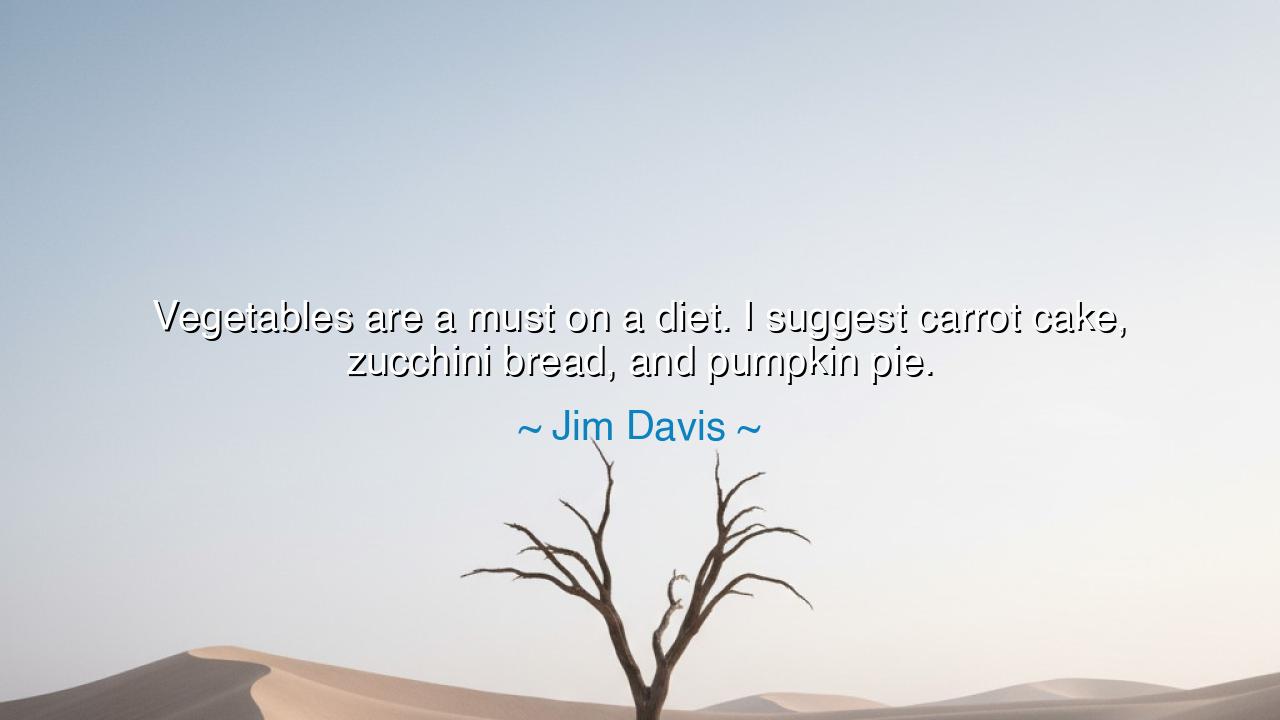
Vegetables are a must on a diet. I suggest carrot cake, zucchini
Vegetables are a must on a diet. I suggest carrot cake, zucchini bread, and pumpkin pie.






In the grand journey of life, where the body and soul seek balance, there are moments when the simplest of truths reveal themselves in the most unexpected ways. Jim Davis, the creator of the beloved Garfield, speaks humorously yet profoundly in his words: “Vegetables are a must on a diet. I suggest carrot cake, zucchini bread, and pumpkin pie.” In these playful words, there lies a deeper message, one that speaks to the timeless wisdom of moderation, the balance between indulgence and nourishment, and the need to find joy in the simplest pleasures of life—even in something as humble as a vegetable.
The ancients understood well the importance of food not only as sustenance but as a source of joy and vitality. Hippocrates, the father of medicine, spoke often of the relationship between food and health, saying, “Let food be thy medicine and medicine be thy food.” The ancient Greeks knew that the body was a temple, and it was to be nourished with care. Yet, they also understood that food was not simply to be consumed out of necessity but was a celebration of life, a way to connect with the earth and each other. Davis’ suggestion, though playful, speaks to this deeper truth: vegetables, in their purest form, are meant to be enjoyed, and even in the context of indulgence—whether through carrot cake or pumpkin pie—there is space for both nourishment and pleasure.
Consider, too, the ancient Romans, whose banquets were a blend of simplicity and extravagance. Their meals were a reflection of their culture—rich in flavor, moderate in portion, and always a celebration of abundance. Yet, despite their love for excess, they never forgot the importance of balance. The great philosopher Cato the Elder would often write about the power of simple foods, emphasizing that the body should be nourished without overindulgence. And while the Romans might have been known for their lavish feasts, they also knew the importance of moderation, as well as the need to enjoy life’s pleasures without losing sight of health. Davis’ humorous suggestion—carrot cake as a vegetable—captures this spirit of balance, where indulgence and nourishment can coexist, as long as we keep them in harmony.
The lesson in Davis’ words is one of joy and moderation. It is easy to get caught up in the rigid extremes of dieting, where we focus too much on restriction and too little on the simple pleasure that food can bring. The ancients, from the Greeks to the Romans, understood that food is not just fuel for the body but a way to enrich the soul. In their feasts, food was a celebration of life, a means of connecting with others and enjoying the bounty of the earth. Similarly, Davis’ playful approach reminds us that we need not forsake joy for the sake of health, nor should we succumb to excess at the expense of well-being. There is room for both—nourishment and delight.
Look to the example of the Vikings, fierce warriors who were known for their strength and valor. Yet, in the midst of their conquests, they understood the importance of balance in all things, including food. The Viking diet was simple, with a focus on grains, vegetables, and meat, providing the nourishment needed for their long voyages and grueling battles. Even though they were warriors, they ate with care and purpose, knowing that the strength of the body was rooted in moderation. They did not indulge in excess, but they also did not deprive themselves of the simple pleasures of life, like bread or berries. In this way, they embodied the balance that Davis humorously alludes to: a life that honors both the practical and the joyful aspects of nourishment.
The true wisdom to be gleaned from Davis’ quote lies in the balance between indulgence and health. Life is a series of choices, and often, it is the mindful balance between what nourishes the body and what brings pleasure to the soul that leads to true well-being. The lesson is not to avoid the foods that bring joy, but to embrace them in moderation, to savor them without guilt or excess. Just as the ancients practiced moderation in their meals, so too must we find a way to incorporate both the sustaining and the delightful in our daily lives.
So, as you go forth on your journey, remember the wisdom of Davis and the ancients: the act of eating is not just about sustenance; it is about embracing the joy and nourishment that comes from both the simple and the indulgent. Whether it’s a carrot cake or a zucchini bread, let it be a reminder that balance is the key to a fulfilling life—one where both body and soul are nourished, and the simple pleasures are savored without guilt. Let your meals be an expression of gratitude, moderation, and joy, and may you find strength in knowing that nourishment, in all its forms, is a gift to be celebrated.






AAdministratorAdministrator
Welcome, honored guests. Please leave a comment, we will respond soon